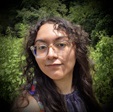Diana Solano-Oropeza

Diana Solano-Oropeza completed their BS in physics with an astrophysics concentration and a minor in sociology at Drexel University in 2021. Diana started research at Drexel through the STAR Scholars program, enabling them to work in Dr. Stephen McMillan's computational astrophysics group for the summer in between their freshman and sophomore years. Under McMillan, they developed a way to produce visual mockups of early star formation simulations comparable to real-life observational images. Later, in their junior and senior years, Diana joined Information Science professor Dr. Jake Ryland Williams' CODED lab, a highly interdisciplinary group that focuses on tackling data science and engineering programs through a socially aware lens. Throughout their third co-op (funded by Drexel LSAMP) and their senior thesis, they tackled a computational linguistics problem concerning the breakdown of Zipf's law in certain domains that required statistical physics to solve, pertinent to natural language processing and the moderation of AI in social media.
After graduating from Drexel, Diana enrolled in the Bridge to the PhD in STEM program at Columbia University. Under the supervision of Dr. David Kipping in the Cool Worlds Lab in the Astronomy Department, they have been developing a catalog of eccentricity data for numerous TESS-detected exoplanets orbiting low-mass stars using a novel technique called the photoeccentric effect.
Diana was awarded the NSF GRFP for their plans to expand and build upon this catalog, address problems in planetary formation and habitability, and engage in bilingual science communication (inspired by their federal work-study position at the Academy of Natural Sciences!). This fall, they will start their PhD in Cornell University's Department of Astronomy, where they will focus on exoplanets, astrostatistics, and astrobiology.
Last updated: July 2023